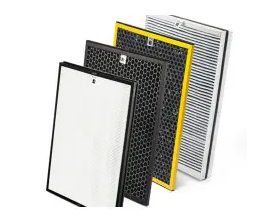Does the air purification feature filter out viruses? Can I use a HEPA filter in my car to protect against the new coronavirus?
Does the air purification feature filter out viruses? Automobile useHEPA filterDoes it protect against the new coronavirus?
The face of the virus we can do is to understand more about the pathology and prevention methods, is the Chinese New Year period, driving is essential, how to disinfect the vehicle and what precautions? Do I need to wear a mask when I drive? Can the air conditioning filter filter viruses?HEPA filterDoes it protect against coronavirus?

Does the air purification feature completely filter out viruses?
First of all, let's explain the conclusion: ordinary filters are not effective, HEPA filter paper of E11 grade or above can filter, but the car interior is not a completely closed space, no matter how good the filter is, it will not have a complete isolation effect. As for the geometry of the principle, we have prepared some information below for those who are interested.
Here is a basic knowledge needs to be clear, for gasoline cars, do not confuse the air filter and air conditioning filter, air filter is prepared for the engine "mask". Electric car owners do not need to distinguish between the two, after all, the motor does not need to breathe.
Many private cars are equipped with air purification features, such as Volvo's Clean zone function, Tesla's "biochemical mode", BYD's green system, etc. These purification devices are based on the air conditioning filter element filtration to achieve air purification. Some of them use multi-layer filters and add activated carbon; some add some catalysts to oxidize formaldehyde, benzene, etc.; some adsorb particles and other harmful substances through static electricity.
HEPA air-conditioning filters have attracted a lot of attention, but only some high-end cars are equipped with HEPA air-conditioning filters, can they effectively prevent viruses from entering private cars?
HEPA (High Efficiency Particulate Air Filter) filters can effectively isolate PM0.3 (particles with a diameter of 0.3 microns), and can achieve N95 level of protection, although it still can not reach the nano level of protection, but it should be known that viruses are usually not suspended in the air alone, but adsorbed in the larger size of the droplets above, and this time HEPA filters can isolate most of the virus invasion. HEPA filter cartridges are able to isolate most of the viruses from invading the air, although they still cannot reach the nano level of protection, but we should know that viruses are usually not suspended in the air alone, but will be adsorbed on the larger droplets. What is the principle of HEPA filtration?
HEPA filtration is categorized into 4 forms: interception, gravity, airflow, and van der Waals.
1, the interception mechanism that we commonly understand the sieve, generally 0.5μm, 10μm of large particles are intercepted "sieve" down.
2, small size and high density dust particles under the influence of gravity, when passing through the HEPA speed reduction, like sediment in the bottom of the river as natural settlement in the HEPA.
3, the filter mesh weave unevenly to form a large number of air vortex, small particles in the airflow cyclone adsorption in the HEPA.
4, ultra-fine particles do Brownian motion impact HEPA fiber layer, by the influence of van der Waals force to get purified. Such as less than 0.3μm virus carriers are purified under the influence of this force.
Two common misconceptions
Myth 1: HEPA on 0.3 micron microparticles purification efficiency can reach 99.97% above, then it is 0.1 micron microparticles purification effect is not sure, right?
Thinking this way is actually a conceptual error. Think about it, why is the effectiveness of HEPA measured in terms of 0.3μm particles instead of 0.1μm? In fact, PM0.3 is more likely to break through the protection of HEPA filters because it is less susceptible to van der Waals' forces, so a filter that is 99.97% effective against PM0.3 is even 99.99% effective against PM0.1.
Myth 2: The smallest particulate matter our HEPA can filter is PM0.1.
Similarly, PM0.3 is more likely to break through HEPA protection than PM0.1, so it is problematic for individual manufacturers to say that the smallest particle they can filter is PM0.1. Or some people say he can only filter PM0.3 can not filter PM0.1 is also unreasonable.
Does changing the HEPA cartridge mean that everything will be fine? Obviously it's not that simple. After all, there are many grades of HEPA filters.
To achieve N95 level protection, you should use at least an E11 or higher HEPA filter. The most commonly used filter cartridge is the H13, which is theoretically equivalent to an N100 mask with a higher level of protection. A test conducted by an authoritative organization found that for the purification of fine particles such as PM2.5, the difference between the internal and external circulation was as much as 3 times. From the use of external circulation mode, no matter what kind of air conditioning filter, it is difficult to reduce the PM2.5 value, in the face of the current epidemic prevention suggests that we use the car air conditioning in the mode of opening the internal circulation.
Kunjing Filter
Please go to "Backstage - User - Profile" to fill in your personal description.
© Kunshan Joy King Electronic Technology Co. Site Map Su ICP No. 17058908


